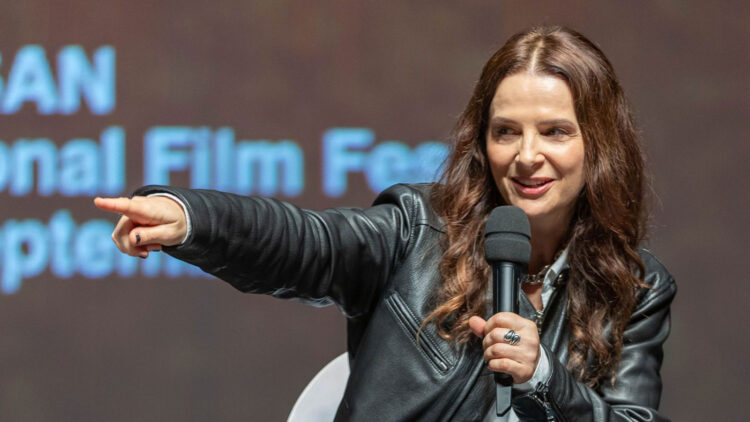
In 2008, Juliette Binoche paired with dancer Akram Khan for in-i, an experimental dance work about a couple’s dissolving relationship. They performed the piece 120 times in theaters around the world. Binoche’s sister Marion Stalens shot a documentary about the production, Juliette Binoche dans les yeux, released in 2009. Now, some 16 years later, Binoche has assembled her own documentary, In-I In Motion, from the original film and also 170 hours of outtakes and rushes.
A guest at this year’s Busan International Film Festival, Binoche gave interviews, Q&As, press conferences, and a master class devoted to her directorial debut. The Oscar-winning actor has worked with a who’s who list of directors, from Jean-Luc Godard and Leos Carax to international filmmakers like Abbas Kiarostami, Hou Hsiao-hsien, and Hirokazu Kore-eda. The festival screened classics like Three Colors: Blue and The Lovers on the Bridge, as well as In-I In Motion.
“I know it’s too long as a film,” she acknowledged about her documentary at a press conference. “The experience of watching the film at San Sebastian was eye-opening. The next time you see me in another festival, the film will be different. It needs to be better, because right now it’s repetitive in the monologues and scenes.”
Binoche combed through all the rushes, outtakes, rehearsal video and audio recordings, and material from the original documentary, joking that, “I found it very difficult to sit down for hours and days and years. The lower back pain I didn’t like very much.” The performer used three different editors to find a narrative. Instead of writing a script, she posted pictures from each scene on a whiteboard in her painting studio. The process brought into sharp relief the differences between a theater piece and film.
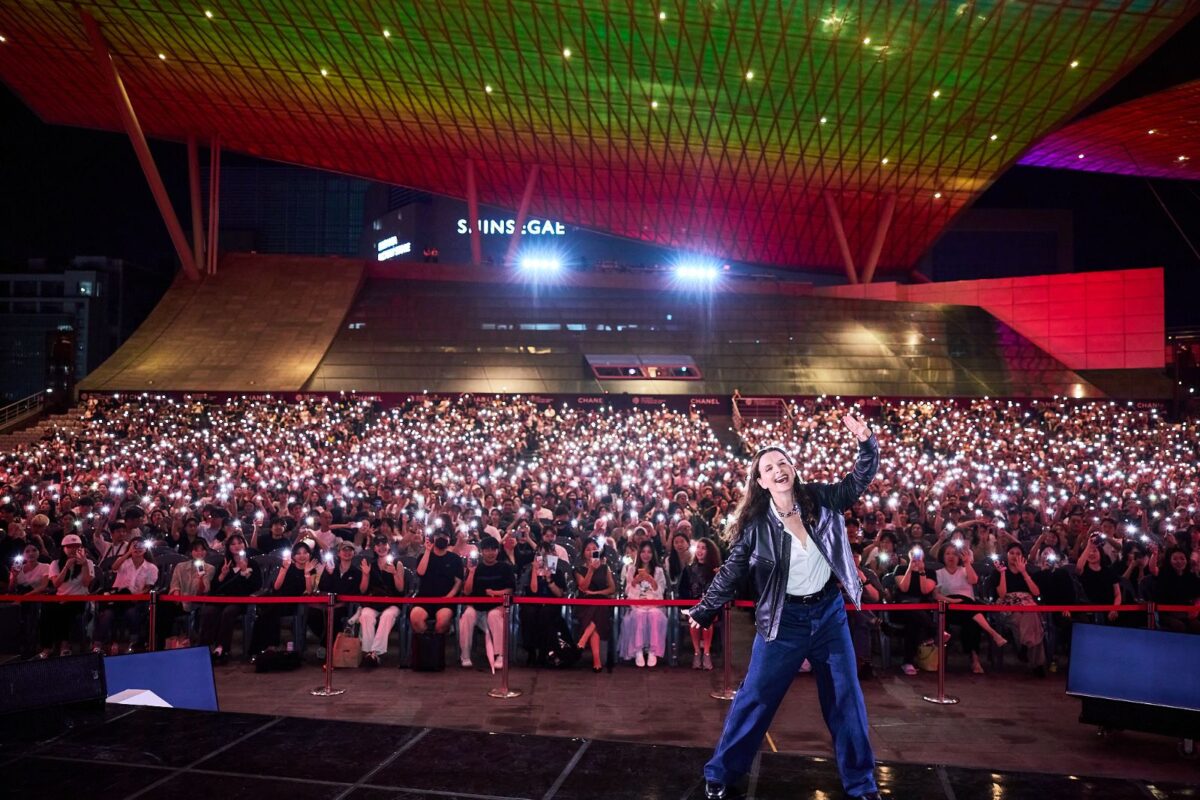
“You don’t have the same perceptions,” she noted. “People who have seen the show will have a certain memory of it. But when I can use close-ups, they will see the show in a different way. The choices you make as a director affect the way people will perceive the piece. That was so important for me.”
Binoche was surprised to discover that the hours of improvising she initially found so interesting and inventive with Akram Khan “turned out to be largely crap.” Even so, the documentary includes telling details about the physical demands behind the project. “Dance is about suffering,” Binoche says at one point. “So is acting,” Akram replies. The film includes interactions between Binoche and acting coach Susan Batson and Su-Man Hsu, a rehearsal director and movement coach. They helped refine her dance, while she gave acting advice to Khan.
“You don’t stop acting because you’ve reached the end of your lines,” she remembers telling the dancer. “Susan said if you only count and think of movement while you dance, it’s crap,” she went on. “You’ve got to lift your actions to movement. That was my challenge.”
“It’s possible to do another art form, even though you know nothing about it, when you start with a sensation. That’s the key to any art. You start from an inside world. The form doesn’t matter. You have to be true and real and personal.”
What Binoche found especially difficult about the editing project was trying to connect her memories of the production with the reality of her footage. “Finding the equilibrium is what directors do,” she said. “It took me a while watching dailies to find that path. Intuition is intuition. You don’t know why you have a feeling, but you have it. You can’t explain why.”
In talking about Three Colors: Blue, Binoche said she based her character on a language coach who lost her husband and child. She also remembered tangling with director Krzysztof Kieślowski over his shooting style. Kieślowski came from a tradition in Poland where film was incredibly expensive. “Most of the time he just wanted to do one take,” she remembered. “We would rehearse like five times and then do only one take. I was fighting, saying, ‘Krys, I have to do one more please.'”
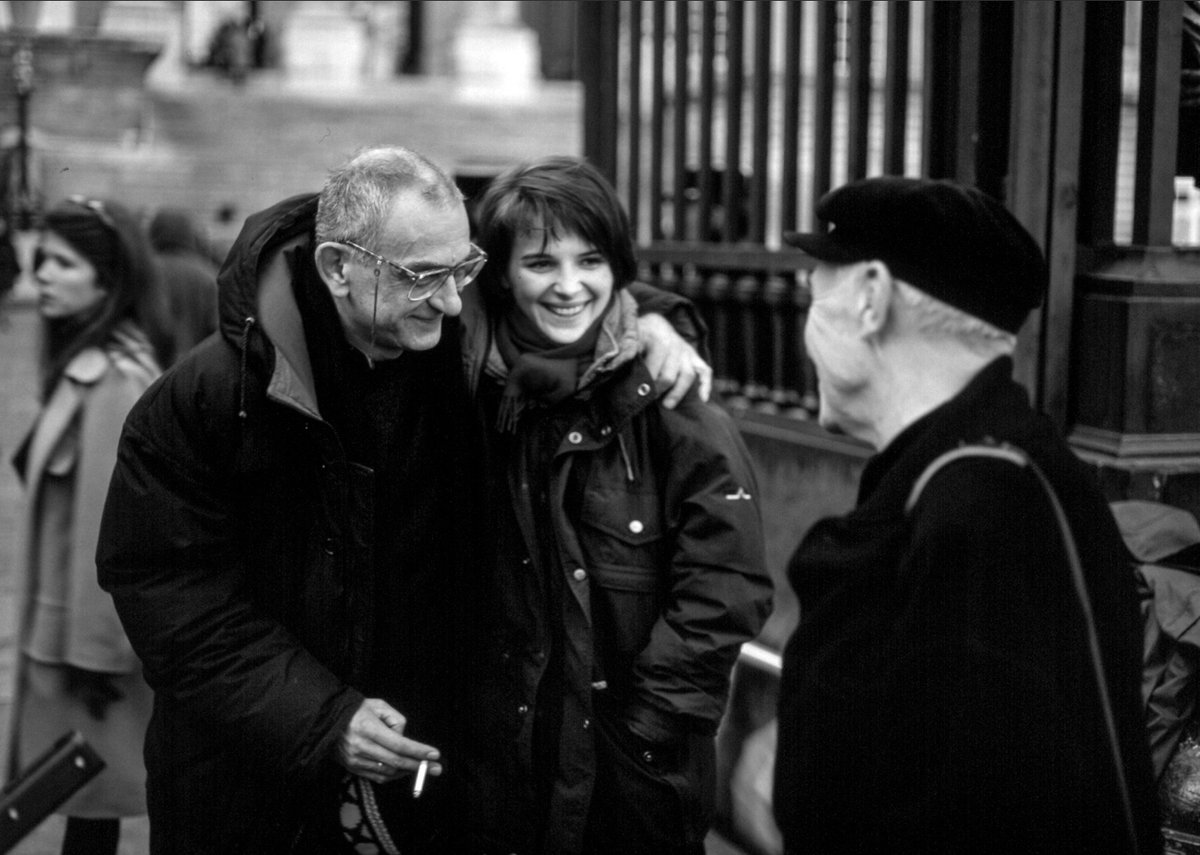
Binoche said that Kieślowski would complain when she performed differently during the take than during rehearsal. “It was hard for him to understand that I’m not a mechanical kind of actress. My work needs to be coming from a more mysterious place. It was a fight to get a second take, unless there was a technical problem with the camera or sound. So sometimes I had to say, ‘Hey, Krzysztof, I had a technical problem.’ It became a kind of joke between us.”
Binoche felt that if she didn’t push Kieślowski, she would replay her performance over and over that night. She pointed out that directors aren’t always making decisions on set, but choose takes in the editing room. “I said to him, ‘You’re in France now, you can do as many takes as you want. mk2 [the production company] has lots of money.’ It was hard to change his mind, but it was a very joyful shoot.”
Binoche said that Kieślowski had planned to start another film trilogy about paradise, purgatory, and hell before his untimely death in 1996. “Just after Blue I got pregnant,” Binoche said. “That was 32 years ago. I have a son that age today. With Certified Copy I had two children in my life. It’s very challenging. You feel responsible as a mother and as an artist. It’s a crazy life traveling all over the world. You want to make a life for your children, to have them feel protected. But there are moments when they feel abandoned.”
Binoche joked about films she missed, like Jurassic Park. She even had to turn down Three Colors: Blue at first because she was trying to finish The Lovers on the Bridge, a film that took years to complete. “I gave my word to Leos,” she said. “I couldn’t go back on that.”
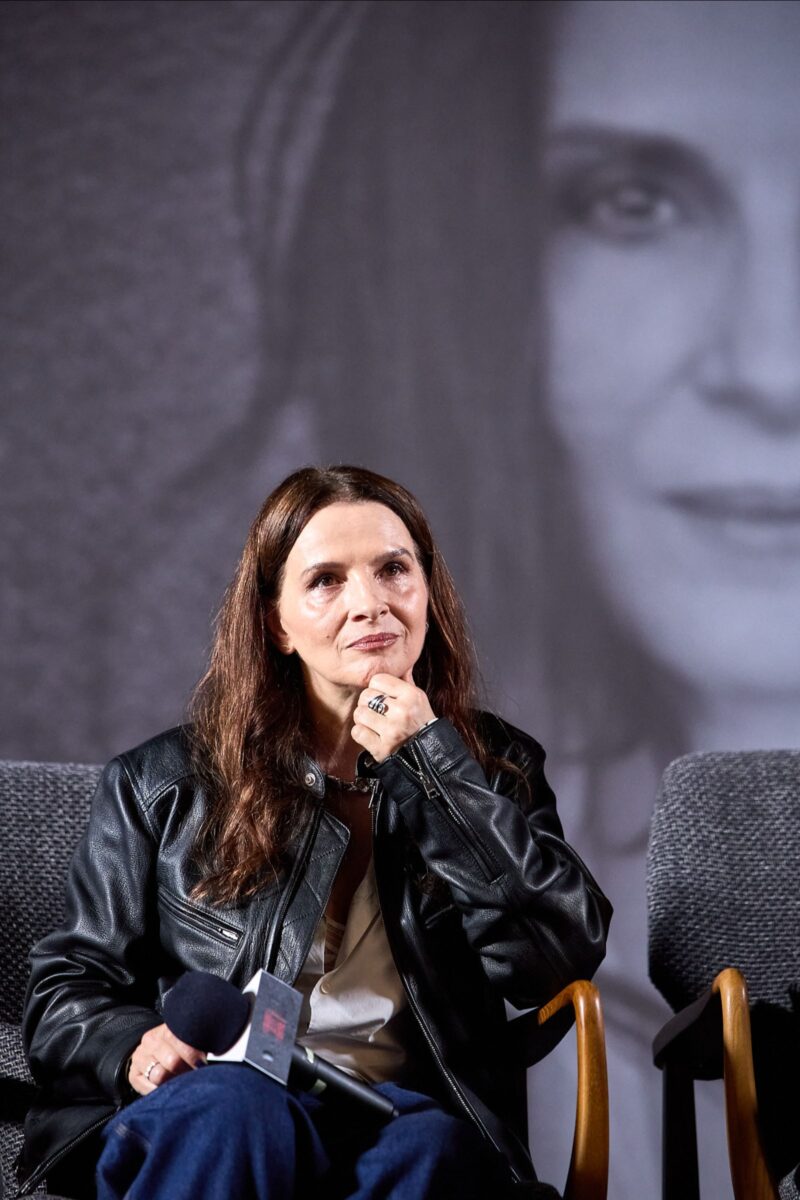
The Busan International Film Festival––which celebrated its thirtieth edition with 328 films, 90 of them world premieres––opened with No Other Choice, Park Chan-wook’s pitch-black adaptation of a Donald Westlake novel. The closing film, Zhang Lu’s Gloaming in Luomu, also won the festival’s first Best Film Award.
In addition to introducing a Competition category, the festival handed out over two dozen awards, honoring filmmakers like Sylvia Chang, Marco Bellocchio, and Jafar Panahi. Chang introduced her latest project as producer, the sci-fi drama Measure in Love. Other festival guests included Michael Mann, delivering a master class on Heat while teasing its sequel; Guillermo del Toro with Frankenstein; Bi Gan with Resurrection; the director and cast of Kokuho; and a surprise visit by Tony Leung Chiu Wai in support of Ildiko Enyedi’s Silent Friend.
The Taiwanese superstar Shu Qi had three projects at the festival, and won Best Director for her debut feature Girl. Director Anshul Chauhan (Tiger) shared the Hylife Vision Award with Sanju Surendran, whose moving drama If on a Winter’s Night was executive produced by Payal Kapadia.
Coming-of-age films seemed to dominate several categories. Titles like Amoeba, The Accordion Door, Funky Freaky Freaks, En Route To, and ALL GREENS depicted high schoolers, many of them from privileged private academies, dealing with broken homes, substance abuse, thwarted romances, mean classmates, and failed exams.
In Tan Siyou’s Amoeba, four Singaporean co-eds face choices about college that could end their friendships. Much like this year’s Happyend, the plot is set a tightly disciplined school where small gestures of independence are blown out of proportion by teachers and parents.
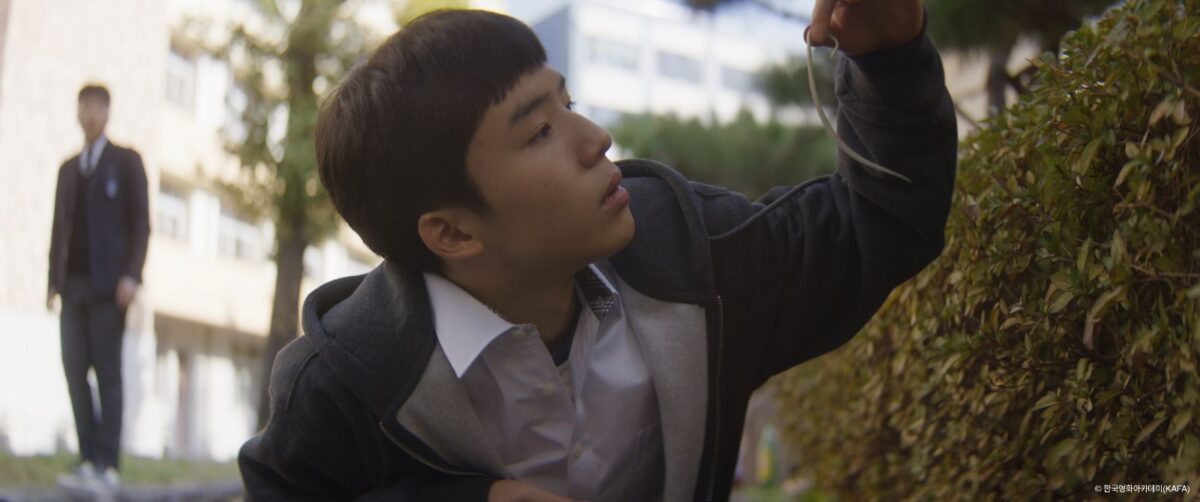
The Accordion Door
Son Kyeong-su’s directorial debut The Accordion Door brought sci-fi trappings to a story of a misunderstood youth at a turning point in his life. Moon Woo-jin won the festival’s Actor of the Year award for his finely calibrated performance.
Funky Freaky Freaks was an icy blast of nihilism broken into three chapters that follow its students on a downward trajectory into violence. The first feature by Hang Chang-lok used splashy color grading and maniacal editing to pull viewers into a bleak but still lively world. Winner of a Special Jury Award.
ALL GREENS was even more fun. The second feature by director Koyama Takashi, the film follows three outcast coeds in a rural Japanese town who form a haphazard drug ring. The beguiling Sara Minami plays the lead Boku, a wannabe rapper who defies everyone trying to hold her down.
En Route To stood the typical coming-of-age formula on its head, offering an unpredictable plot tied to exceptional performances. Reminiscent of Never Rarely Sometimes Always, only with an angry streak and caustic humor, it throws school roommates together on a mission to either secure an abortion or expose the teacher responsible. Yoo Jaein’s film was produced by the Korean Academy of Film Arts and won the New Currents Award. Lee Jiwon won the Busan Best Actor Award for her steely performance.
Pointing to the record attendance of over 238,000, festival programmer Karen Park promises an even broader schedule in the thirty-first edition planned for October 2026.
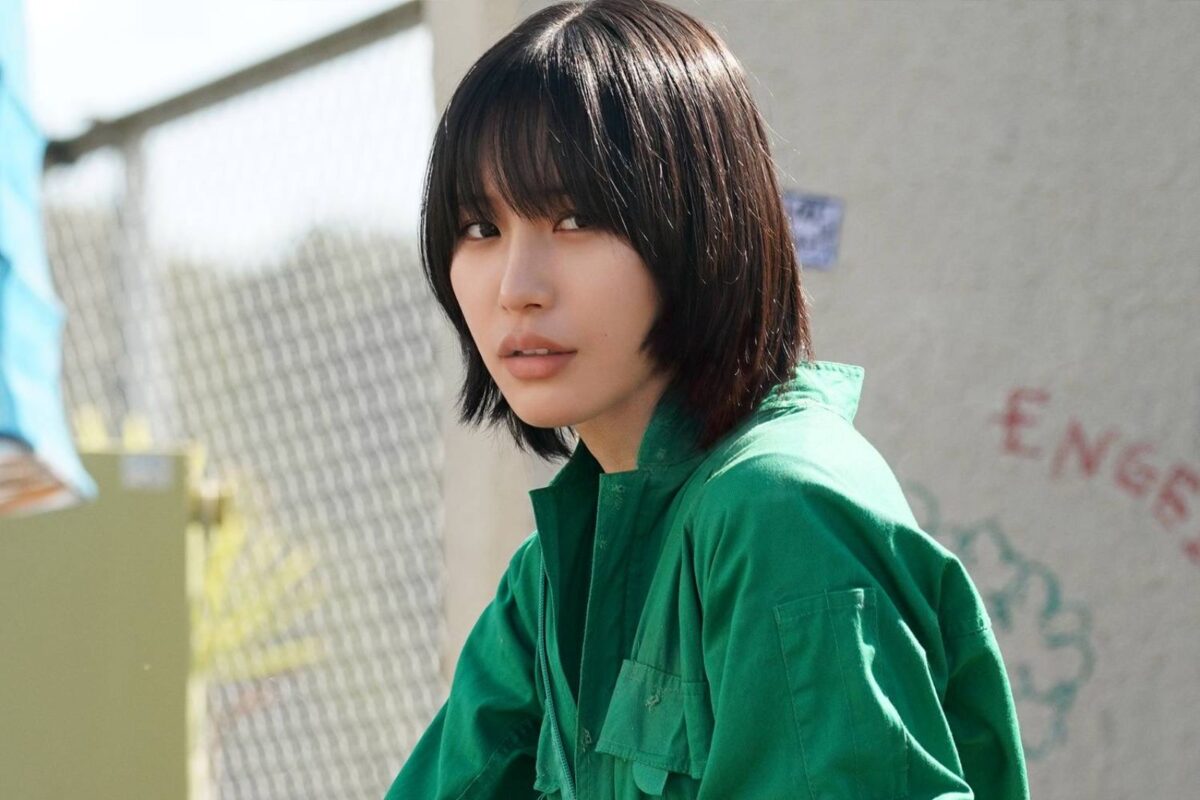
All Greens
The post Juliette Binoche Reflects on Working with Krzysztof Kieślowski at Busan International Film Festival first appeared on The Film Stage.
from The Film Stage https://ift.tt/sc68PHd

0 Comments